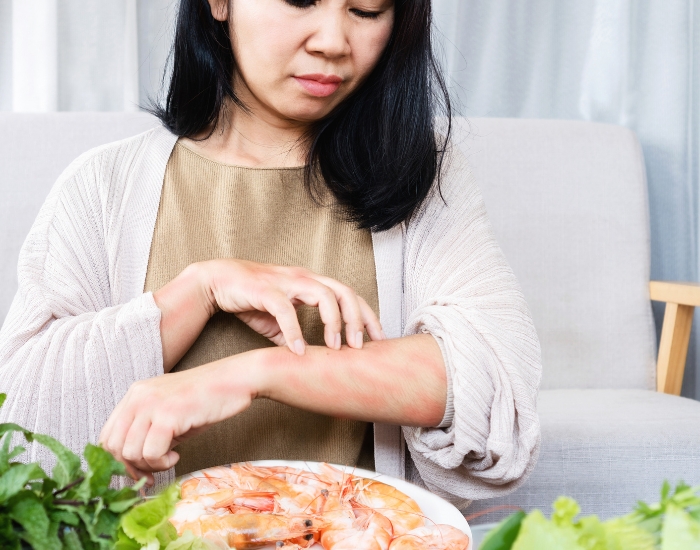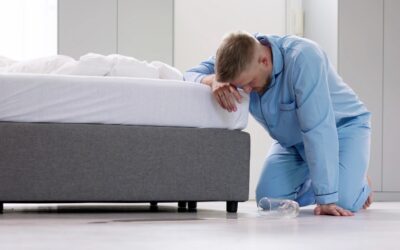Experiencing hives after meals can be an unsettling and uncomfortable experience. Known medically as urticaria, hives are raised, itchy welts on the skin that can range from mild to severe. While they may seem like a minor inconvenience, frequent occurrences can signal underlying health issues that require attention.
Understanding the possible causes and learning when to seek medical advice is crucial for effectively managing this condition. In this blog, we’ll explore the causes of post-meal hives, identify symptoms to watch for, and provide actionable advice for finding relief.
What Causes Hives After Meals?
Hives after eating are often linked to food allergies, but several other factors may contribute to their onset. Common causes include:
- Food Allergies: Allergic reactions to specific foods like nuts, shellfish, eggs, or dairy are among the most frequent triggers. When your immune system perceives a food protein as harmful, it releases histamines that cause hives.
- Food Intolerances: Unlike allergies, food intolerances (e.g., lactose intolerance) do not involve the immune system but can still provoke hives as part of a digestive reaction.
- Food Additives and Preservatives: Substances like artificial colors, flavors, and preservatives (e.g., sulfites in wine or MSG in processed foods) can sometimes trigger hives.
- Stress and Anxiety: Emotional stress can exacerbate skin reactions, including hives, particularly if combined with other triggers.
- Underlying Health Conditions: Conditions like chronic urticaria, autoimmune diseases, or histamine intolerance may cause hives that worsen after meals.
Recognizing the Symptoms of Post-Meal Hives
Hives caused by food typically appear within minutes to a few hours after eating. Symptoms to look out for include:
- Raised, red, or skin-colored welts on the skin
- Intense itching
- Swelling around the eyes, lips, or throat (angioedema)
- Symptoms that fluctuate in size and location over time
In severe cases, hives may be accompanied by difficulty breathing or swallowing, signaling an anaphylactic reaction—a medical emergency that requires immediate attention.
When to Consult a Doctor
If you experience frequent or severe hives after meals, it’s essential to seek professional medical advice. Consulting a physician is particularly crucial if:
- Hives persist for more than 24 hours or recur frequently
- Over-the-counter antihistamines provide little to no relief
- Symptoms are accompanied by gastrointestinal issues, fever, or joint pain
- Swelling in the throat or difficulty breathing occurs (seek emergency care immediately)
Actionable Steps to Manage Hives
Managing hives after meals often involves a combination of dietary adjustments, medical evaluation, and lifestyle changes. Here are steps to consider:
- Identify and Avoid Triggers: Keep a food diary to track what you eat and any subsequent hives. This can help pinpoint specific foods or additives responsible for your symptoms.
- Opt for an Elimination Diet: Under medical supervision, temporarily eliminate suspected trigger foods and reintroduce them one at a time to identify the culprit.
- Use Over-the-Counter Medications: Antihistamines like cetirizine or loratadine can reduce itching and swelling. Always follow dosage instructions and consult your doctor if symptoms persist.
- Consult an Allergist: Allergy testing (skin prick or blood tests) can identify specific allergens, guiding targeted treatment.
- Consider Stress-Reduction Techniques: Practices like mindfulness meditation, yoga, or deep breathing can help minimize the impact of stress-related hives.
The Role of Professional Care
When hives persist despite self-care or dietary adjustments, consulting a healthcare professional is crucial. Physicians can perform detailed evaluations, including allergy tests, blood work, and assessments for underlying conditions like autoimmune diseases or histamine intolerance. Treatment plans may include prescription medications or long-term management strategies tailored to your specific needs.
At Careprime Clinic, our expert physicians specialize in diagnosing and treating recurring hives with a patient-centered approach. We’re committed to helping you uncover the root cause of your symptoms and providing comprehensive care to improve your quality of life.
Final Thoughts
Frequent hives after meals are more than a mere inconvenience; they can significantly impact your daily life and signal deeper health concerns. Identifying the triggers and addressing the root causes is essential for effective management. Don’t ignore persistent or severe symptoms—seeking professional care is a proactive step toward lasting relief and better overall health.
If you’re struggling with frequent hives after meals, Careprime Clinic is here to help. Schedule a consultation today to receive personalized care and support from our experienced medical team.
Disclaimer: The information provided in this blog is for educational purposes only and is not intended as medical advice. It should not be used to diagnose or treat any health condition. Always consult with a qualified healthcare professional for accurate diagnosis and treatment of any symptoms or medical concerns.




